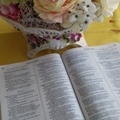[A devotional reflection originally prepared for the congregation of Horley Baptist Church during August 2024]
It was the best of times, it was the worst of times, it was the age of wisdom, it was the age of foolishness, it was the epoch of belief, it was the epoch of incredulity
Our opening quotation comes from the first lines of ‘A Tale of Two Cities’ published by Charles Dickens in 1859. The story is set during the French Revolution (1789-1799); the two cities in the novel are London and Paris, both cities were rife with moral corruption and anarchy.
Dickens wrote those words in the context of the events of the late 18th century but they could equally well have been applied to those cities in modern times.
Recently I saw two photographs from the same two cities, albeit some 230 years later. The photo from London brought to mind the scene on Mount Carmel with Jezebel’s 450 prophets cavorting themselves in the worship of Baal whilst that from Paris resembled how Belshazzar’s feast might have been, albeit without the writing on the wall. Together both photos reminded me of the Biblical record of Sodom and Gomorrah. In that account we see Abraham pleading on behalf of their citizens:
“Suppose there are fifty righteous within the city. Will you then sweep away the place and not spare it for the fifty righteous who are in it?”
Genesis 18 v24 [NIVUK]
Are we willing to make the effort to plead for our fellow citizens in a similar way?
We know that there were not enough righteous people to save Sodom and Gomorrah. Perhaps it is just as well for London and Paris that there are still significant numbers of righteous people living there.
The primary theme running through Dickens’s novel is that of love and self-sacrifice. Charles Darnay is a French aristocrat who, despite his renunciation of the excesses of his class, is nevertheless at great risk of his life. Sydney Carton is an English barrister whose lifestyle is not what one might expect from a person with such a calling. The two men resemble each other, even to the point of loving the same woman, but Carton recognises that Darnay would make the better husband and is content to be a family friend. In due course Darnay is captured by the French revolutionaries and condemned to the guillotine. Carton arranges to take his place. The novel concludes with another oft-quoted soliloquy:
“It is a far, far better thing that I do, than I have ever done; it is a far, far better rest that I go to than I have ever known.”
Some reviewers have suggested that this act of self-sacrifice resembles in a small way the death of Jesus Christ on behalf of those whom he loved. He himself said:
Greater love hath no man than this, that a man lay down his life for his friends.
John 15 v13 [KJ21]
Although there is no overtly spiritual intent in the book, nevertheless Dickens showed that even in times of decadence, lawlessness and social unrest there is still hope.
One day when heaven was filled with His praises,
One day when sin was as black as could be,
Jesus came forth to be born of a virgin,
Dwelt among men, my example is He!
J. Wilbur Chapman (1910)
References:
[1]
Bible quotations: Unless otherwise specified, quotations are taken from the resources of Bible Gateway or Bible Hub, in accordance with the licencing conditions outlined on our Site Policies page.
Bible dates:
Where appropriate, the dates given for Biblical events are based on the Bible Timeline resource
and are subject to the constraints defined on the corresponding webpage.
 Horley Baptist Church online
Horley Baptist Church onlineHBC main site
Confidential prayer link
Link to Recent Reflections
Link to Index of Bible Passages
Last week’s reflection: What Can We Glean from This?
Contributed by Steve Humphreys; © Steve Humphreys

Thank you Steve for your reflection about a A Tale of Two Cities by Charles Dickens. It was really interesting that Sydney Carton is prepared to sacrifice himself in place of Charles Darnay at the guillotine during the French Revolution. Then you mention the example of Jesus and his death at the cross for those whom he loved. There is no greater sacrifice than this.
All the more poignant when you realise that had Darnay died then Carton could have married his widow.